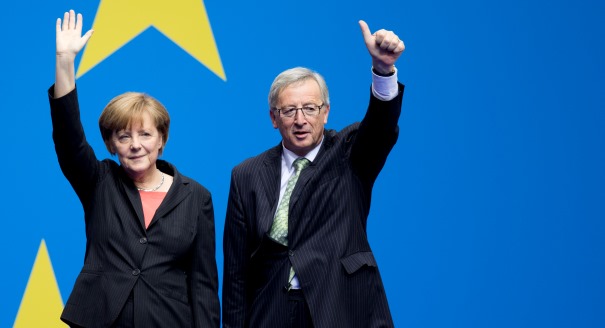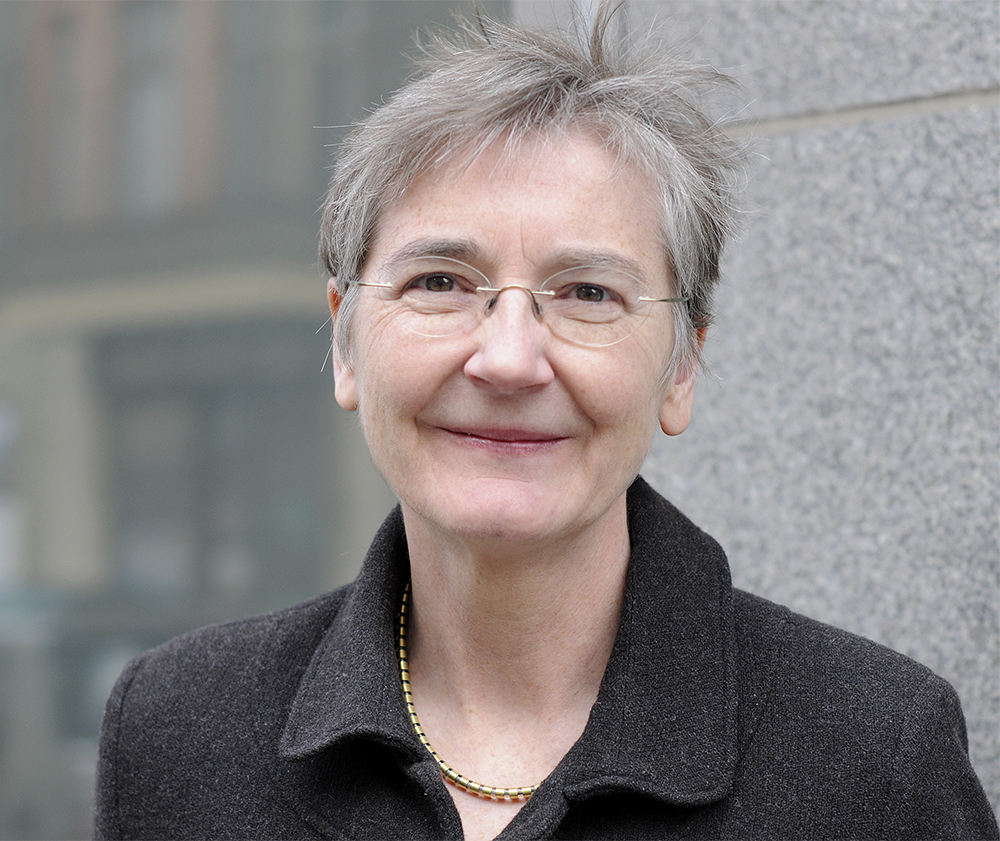Judy Dempsey
{
"authors": [
"Judy Dempsey"
],
"type": "commentary",
"blog": "Strategic Europe",
"centerAffiliationAll": "",
"centers": [
"Carnegie Endowment for International Peace",
"Carnegie Europe"
],
"collections": [],
"englishNewsletterAll": "",
"nonEnglishNewsletterAll": "",
"primaryCenter": "Carnegie Europe",
"programAffiliation": "",
"programs": [],
"projects": [],
"regions": [
"Western Europe",
"Germany",
"Russia"
],
"topics": [
"Democracy",
"EU"
]
}
Source: Getty
Merkel’s European Parliament Election
For Germany’s conservatives, getting the European Parliament to end daylight saving time is more important than campaigning for Jean-Claude Juncker as the next European Commission president.
Jean-Claude Juncker is well known and well liked among Germans. He speaks fluent German and appears regularly on German radio and television. He still burns with ambition for Europe.
This former prime minister of Luxembourg, who has spent almost his entire political career campaigning for European integration, is running to become president of the European Commission later this year.
Juncker is the nominee of the conservative European People’s Party (EPP). Not all conservatives are pleased with his nomination, not least Chancellor Angela Merkel, who leads Germany’s Christian Democratic Union (CDU), the EPP’s biggest and most powerful member party. But after the Party of European Socialists elected Martin Schulz, a German, as their candidate for commission president, the EPP had no choice but to put forward its own candidate.
In contrast, Merkel’s speech was lackluster, revealing no sense of emotion for the European idea. Yet delegates feted her, not Juncker. And instead of debating ways to push Europe forward, the most momentous decision that the CDU took that day was to urge the next European Parliament to abolish daylight saving time! You really wouldn’t think that this was the party once led by former chancellors Konrad Adenauer or Helmut Kohl.
Even more telling is the CDU’s campaign strategy. Juncker’s picture will not be on any of the party’s election posters. Instead, they will show Merkel, despite the fact that she isn’t standing as a candidate.
This is all about tactics, of course. Merkel loathes the idea of Juncker heading the European Commission, because he would be a powerful and independent-minded player. The same cannot be said of the current incumbent, José Manuel Barroso, whom Merkel personally endorsed twice precisely because he is weak.
Having an underwhelming commission president suited Merkel just fine, as her inclination is far less integrationist than that of her conservative predecessor as chancellor, Helmut Kohl. For ten years, Merkel’s choice robbed the EU of a strong, convincing, and creative voice. Power shifted back toward national capitals, particularly Berlin.
Now as then, the last person she wants running the commission is someone like Juncker. But can she really refuse to back him if the European People’s Party emerges from May’s elections as the strongest group in the European Parliament?
She can. It is the European Council, which brings together EU heads of state and government, that chooses the commission president. That gives Germany (and France), whose voting strength is considerable, immense clout to lobby for its preferred candidate.
And even if the European Parliament’s political factions believe that their decision to nominate their own candidates carries weight, they will be quickly brought back to reality once the member states begin the horse trading over top EU jobs as soon as the elections are over.
If the European Council decided to opt for someone other than Juncker or Schulz, it would have a hard sell to get that candidate approved by the parliament. EU leaders may not want that kind of confrontation, particularly as many smaller member states, fearful of German domination, will prefer a strong commission president.
Merkel knows that, of course. That is why it is her photo on the German election posters and not Juncker’s. As the most popular politician in Germany today, and with her party doing well in the opinion polls, Merkel must be hoping that her own personality and popularity will pull in as many votes as possible for the CDU.
If she succeeds, Merkel could strengthen both the EPP’s presence in the European Parliament and her own bargaining position with regard to Barroso’s successor. After all, she could argue that it was she who boosted the EPP’s showing in the elections. She would then be in a strong position to lobby for a candidate who would not threaten her or Germany’s national interests.
But will the EU really be served well by another weak European Commission president? With the euro crisis threatening a comeback, the possibility of a British EU referendum looming, and the Ukraine crisis unresolved, the EU needs someone who wants an ambitious Europe—someone who will reach out to its citizens, will dare to push for further integration, and will be no one’s puppet.
In other words, Europe does not need another Barroso.
About the Author

Nonresident Senior Fellow, Carnegie Europe
Dempsey is a nonresident senior fellow at Carnegie Europe
- Europe Needs to Hear What America is SayingCommentary
- Babiš’s Victory in Czechia Is Not a Turning Point for European PopulistsCommentary
Judy Dempsey
Recent Work
Carnegie does not take institutional positions on public policy issues; the views represented herein are those of the author(s) and do not necessarily reflect the views of Carnegie, its staff, or its trustees.
More Work from Strategic Europe
- Taking the Pulse: Can European Defense Survive the Death of FCAS?Commentary
France and Germany’s failure to agree on the Future Combat Air System (FCAS) raises questions about European defense. Amid industrial rivalries and competing strategic cultures, what does the future of European military industrial projects look like?
Rym Momtaz, ed.
- Macron Makes France a Great Middle PowerCommentary
France has stopped clinging to notions of being a great power and is embracing the middle power moment. But Emmanuel Macron has his work cut out if he is to secure his country’s global standing before his term in office ends.
Rym Momtaz
- How Europe Can Survive the AI Labor TransitionCommentary
Integrating AI into the workplace will increase job insecurity, fundamentally reshaping labor markets. To anticipate and manage this transition, the EU must build public trust, provide training infrastructures, and establish social protections.
Amanda Coakley
- Can Europe Still Matter in Syria?Commentary
Europe’s interests in Syria extend beyond migration management, yet the EU trails behind other players in the country’s post-Assad reconstruction. To boost its influence in Damascus, the union must upgrade its commitment to ensuring regional stability.
Bianka Speidl, Hanga Horváth-Sántha
- Taking the Pulse: Can the EU Attract Foreign Investment and Reduce Dependencies?Commentary
EU member states clash over how to boost the union’s competitiveness: Some want to favor European industries in public procurement, while others worry this could deter foreign investment. So, can the EU simultaneously attract global capital and reduce dependencies?
Rym Momtaz, ed.









